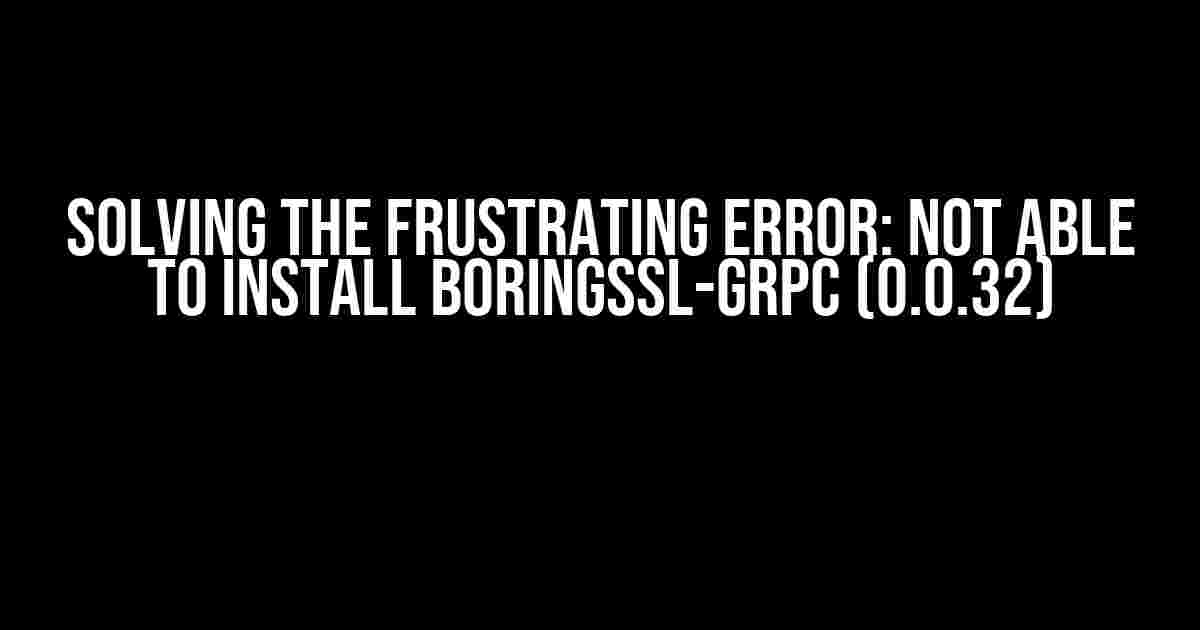Have you ever faced the infuriating issue of not being able to install BoringSSL-GRPC (0.0.32)? You’re not alone! Many developers have struggled with this problem, and it’s about time someone provided a comprehensive guide to solve it once and for all. In this article, we’ll dive into the world of BoringSSL-GRPC, explore the possible causes of the error, and provide step-by-step instructions to overcome it.
What is BoringSSL-GRPC?
BoringSSL-GRPC is a Ruby gem that allows you to use the BoringSSL library with GRPC. BoringSSL is a fork of OpenSSL that provides a more secure and efficient SSL/TLS implementation. GRPC, on the other hand, is a high-performance RPC framework developed by Google. The combination of BoringSSL and GRPC enables you to create secure and scalable networked applications.
Why Can’t I Install BoringSSL-GRPC (0.0.32)?
Before we dive into the solutions, let’s understand the possible reasons behind the error. Here are some common causes:
- Dependency Issues: BoringSSL-GRPC relies on several dependencies, including OpenSSL, GRPC, and Ruby. If any of these dependencies are missing or outdated, the installation process may fail.
- Version Conflicts: Sometimes, the version of BoringSSL-GRPC (0.0.32) may not be compatible with your system’s architecture or other installed gems.
- System Configuration: Your system’s configuration, including environment variables and compiler settings, might be causing the installation to fail.
- Network Issues: Slow or unreliable internet connections can prevent the gem from downloading correctly.
Solutions to Install BoringSSL-GRPC (0.0.32)
Now that we’ve identified the possible causes, let’s move on to the solutions. Follow these steps to successfully install BoringSSL-GRPC (0.0.32):
Step 1: Check Your Dependencies
Ensure you have the required dependencies installed:
sudo apt-get update
sudo apt-get install build-essential libssl-dev libreadline-dev zlib1g-dev
For macOS users, use Homebrew:
brew install openssl readline
Step 2: Update Your Ruby Version
Make sure you’re running a compatible version of Ruby:
ruby -v
If you’re running an outdated version, update to the latest version using:
rvm install ruby-2.7.1
Step 3: Install GRPC
Install GRPC using the following command:
gem install grpc
Step 4: Install BoringSSL
Install BoringSSL using the following command:
gem install boringssl
Step 5: Install BoringSSL-GRPC (0.0.32)
Now, install BoringSSL-GRPC (0.0.32) using the following command:
gem install boringssl-grpc -v 0.0.32
Step 6: Verify the Installation
Verify that the installation was successful by running:
grpc -v
You should see the GRPC version printed. If you encounter any issues during the installation process, refer to the troubleshooting section below.
Troubleshooting Common Errors
If you encounter any of the following errors during the installation process, follow these troubleshooting steps:
| Error Message | Solution |
|---|---|
ERROR: While executing gem ... (Gem::InstallError) |
Try reinstalling the gem using --force flag: gem install boringssl-grpc -v 0.0.32 --force |
ERROR: Failed to build gem native extension. |
Ensure you have the required dependencies installed, and then try reinstalling the gem. |
SSL/TLS handshake failed |
Verify your system’s OpenSSL configuration and ensure you have the correct version installed. |
Conclusion
Installing BoringSSL-GRPC (0.0.32) might seem daunting, but by following these step-by-step instructions and troubleshooting common errors, you should be able to overcome the “not able to install” issue. Remember to update your dependencies, ensure version compatibility, and verify your system’s configuration to avoid common pitfalls. With BoringSSL-GRPC installed, you’ll be ready to create secure and scalable networked applications.
If you’re still facing issues, don’t hesitate to reach out to the BoringSSL-GRPC community or seek help from online forums. Happy coding!
- Check the BoringSSL-GRPC documentation for the latest version and installation instructions.
- Review the GRPC documentation for more information on the RPC framework.
- Explore the OpenSSL documentation to learn more about SSL/TLS implementations.
Frequently Asked Question
Having trouble installing BoringSSL-GRPC (0.0.32)? Don’t worry, we’ve got you covered! Here are some frequently asked questions to help you troubleshoot the issue.
Why am I unable to install BoringSSL-GRPC (0.0.32)?
The most common reason for installation failure is due to incompatible versions of dependencies, such as OpenSSL or GRPC. Make sure to check the version requirements and ensure that you have the correct versions installed. You can try reinstalling the dependencies or updating them to the latest version.
What is the minimum version of OpenSSL required for BoringSSL-GRPC (0.0.32)?
The minimum version of OpenSSL required for BoringSSL-GRPC (0.0.32) is OpenSSL 1.1.1 or later. If you’re using an earlier version, you’ll need to upgrade to a compatible version.
How do I check the version of OpenSSL installed on my system?
You can check the version of OpenSSL installed on your system by running the command `openssl version` in your terminal or command prompt. This will display the version number of OpenSSL installed on your system.
Can I use a different version of BoringSSL-GRPC if I’m experiencing installation issues?
Yes, if you’re experiencing installation issues with BoringSSL-GRPC (0.0.32), you can try using a different version. However, make sure to check the compatibility of the version with your system and dependencies. You can also try using the latest version of BoringSSL-GRPC, which may resolve any installation issues.
What are some common error messages I might see during installation?
Some common error messages you might see during installation include `Error: OpenSSL version too old`, `Failed to install BoringSSL-GRPC`, or `Cannot find OpenSSL headers`. These errors indicate that there’s an issue with the version of OpenSSL or GRPC installed on your system.



